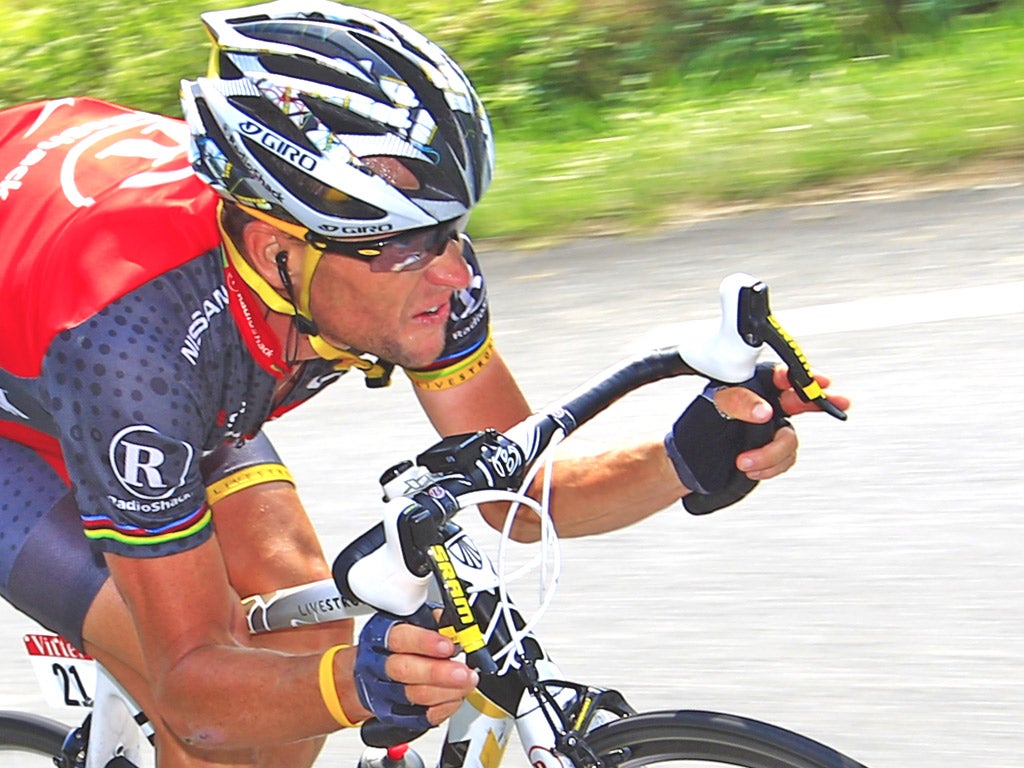The Independent's journalism is supported by our readers. When you purchase through links on our site, we may earn commission.
Cycling: Lance Armstrong - the verdict
US doping body releases extensive evidence of seven-time Tour winner's 'sordid' conspiracy

Your support helps us to tell the story
From reproductive rights to climate change to Big Tech, The Independent is on the ground when the story is developing. Whether it's investigating the financials of Elon Musk's pro-Trump PAC or producing our latest documentary, 'The A Word', which shines a light on the American women fighting for reproductive rights, we know how important it is to parse out the facts from the messaging.
At such a critical moment in US history, we need reporters on the ground. Your donation allows us to keep sending journalists to speak to both sides of the story.
The Independent is trusted by Americans across the entire political spectrum. And unlike many other quality news outlets, we choose not to lock Americans out of our reporting and analysis with paywalls. We believe quality journalism should be available to everyone, paid for by those who can afford it.
Your support makes all the difference.The jaw-dropping scale of the doping programme in which Lance Armstrong played a leading role was revealed last night when the US Anti-Doping Agency published the first batch of what will run to 1,000 pages of evidence, including testimony from 11 of Armstrong's former team-mates.
The agency says it shows beyond doubt that Armstrong's US Postal team ran "the most sophisticated, professionalised and successful doping programme that sport has ever seen".
Usada delivered the long-awaited evidence "of one of the most sordid chapters in sports history" to cycling's governing body, the UCI, and released 200 pages of its "Reasoned decision" – the rest is withheld while three former US Postal team officials contest the charges. It details a widespread doping programme, describing the case as stronger than any assembled by the agency in its 12-year history.
In all, it lists 15 riders who testified against Armstrong, including the former Sky domestique Michael Barry and George Hincapie, who was Armstrong's right-hand man for his seven Tour de France titles.
Usada's chief executive, Travis Tygart, said the evidence proves "the use, possession and distribution of performance-enhancing drugs by Armstrong"; that it "reveals conclusive and undeniable proof that brings to light for the first time this systemic, sustained and highly professionalised team-run doping conspiracy"; that "the USPS Team doping conspiracy was professionally designed to groom and pressure athletes to use dangerous drugs, to evade detection, to ensure its secrecy. A programme organised by individuals who thought they were above the rules".
The report states that Armstrong's career at US Postal, which he joined in 1998 after recovering from cancer, "was fuelled from start to finish by doping". It adds of the role Armstrong played: "He was not just a part of the doping culture on his team, he enforced and re-enforced it."
Barry, who joined Sky when the team was set up in 2009, retired at the end of this season. The Canadian arrived at US Postal in 2002 and doped until 2006, and last night he issued an apology: "Doping [in 2002] had become an epidemic problem in professional cycling. After being encouraged by the team [and] pressured to perform… I crossed a line I promised myself and others I would not: I doped. It was a decision I deeply regret.
"From 2006 until the end of my career, I chose to race for teams that took a strong stance against doping. Although I never confessed to my past, I wrote and spoke about the need for change. Cycling is now a cleaner sport. I apologise to those I deceived."
A spokesperson for Team Sky said: "We have no doubts about Michael being clean during his time at Team Sky." The team was unaware of Barry's testimony to Usada – and his chequered past – until this week.
Hincapie also apologised. He too said he had stopped doping in 2006 having been driven to it in the first place because of the "widespread use of performance-enhancing drugs". He said: "I would have been much more comfortable talking only about myself, but understood that I was obligated to tell the truth about everything I knew. So that is what I did."
Armstrong has always denied doping but in August he announced he would not be contesting Usada's charges. Usada banned him for life. Now it paints Armstrong as the ring leader who intimidated others. Usada initially protected the identities of the riders who gave evidence amid fears they may face retaliation. The 11 team-mates were named: Frankie Andreu, Barry, Tom Danielson, Tyler Hamilton, Hincapie, Floyd Landis, Levi Leipheimer, Stephen Swart, Christian Vande Velde, Jonathan Vaughters and David Zabriskie.
Tygart applauded the "courage" of those who testified against Armstrong. He added: "Lance Armstrong was given the same opportunity to come forward and be part of the solution. He rejected it." Two other members of the team, Dr Michele Ferrari and Dr Garcia del Moral, also received lifetime bans. Three more, Johan Bruyneel, a team doctor Dr Pedro Celaya and team trainer Jose Marti are contesting the charges.
The report alleges that Bruyneel, formerly US Postal's team director, now with RadioShack-Nissan, "learned how to introduce young men to performance enhancing drugs, becoming adept at leading them down the path." It also claims Bruyneel appeared to have "inside information" about the testing.
Join our commenting forum
Join thought-provoking conversations, follow other Independent readers and see their replies
Comments